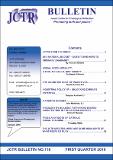| dc.contributor.author | Jesuit Centre for Theological Reflection | |
| dc.date.accessioned | 2020-04-27T07:31:13Z | |
| dc.date.available | 2020-04-27T07:31:13Z | |
| dc.date.issued | 2019 | |
| dc.identifier.issn | 1990-4479 | |
| dc.identifier.uri | https://repository.jctr.org.zm/handle/20.500.14274/65 | |
| dc.description | This is the first issue of JCTR Bulletin this year. We are blessed with articles traversing a wide range of issues. We encourage JCTR readers to take time to read all seven articles presented in this issue of JCTR Bulletin. They are all loaded with very enriching and stimulating ideas. We take liberty to spare some space in this editorial to briefly share some highlights of two of the articles in this issue of JCTR Bulletin to whet your appetite to read all the articles from cover to cover.
One of the articles is on the 2019 national budget by Innocent Ndashe. This article raises the perennial question of the government’s priorities when it comes to budgetary allocations. For instance, where will you justifiably allocate more money between defence, public order and safety in the time of peace and the social sector that attempts to improve the lives of the ordinary people? What do you make of the additional resources allocated (K23.6 billion) to debt servicing (both domestic and external), which is equivalent to the total allocation made to 3 essential areas of expenditure - education, health and social protection?
This issue of JCTR Bulletin also treats JCTR readers to a treatise of the relationship between incentives and improved performance. The article on cognitive cost of incentives by Temple Anuforo, S.J. discusses whether incentives motivate people to think more clearly, faster and more efficiently. This hypothesis has been disputed by recent discoveries by behavioural economists who argue that although human beings are motivated by self-interest in responding to incentives, it does not mean that human beings are not capable of questioning the linear thinking.
The article concludes that incentives work where simple linear thinking is operational but they are counter-productive where complexity or complex problem-solving is involved. We learn from this article that one powerful source for incentives yet to be tapped by many organizations is a “sense of meaning, purpose or fulfilment.” We learn that if people feel that the work they do makes a difference in the world or in the life of someone, they are often motivated to do more. | en |
| dc.description.abstract | This is the first issue of JCTR Bulletin this year. We are blessed with articles traversing a wide range of issues. We encourage JCTR readers to take time to read all seven articles presented in this issue of JCTR Bulletin. They are all loaded with very enriching and stimulating ideas. We take liberty to spare some space in this editorial to briefly share some highlights of two of the articles in this issue of JCTR Bulletin to whet your appetite to read all the articles from cover to cover.
One of the articles is on the 2019 national budget by Innocent Ndashe. This article raises the perennial question of the government’s priorities when it comes to budgetary allocations. For instance, where will you justifiably allocate more money between defence, public order and safety in the time of peace and the social sector that attempts to improve the lives of the ordinary people? What do you make of the additional resources allocated (K23.6 billion) to debt servicing (both domestic and external), which is equivalent to the total allocation made to 3 essential areas of expenditure - education, health and social protection? | en |
| dc.language.iso | en | en |
| dc.publisher | Jesuit Centre for Theological Reflection | en |
| dc.rights | Attribution-NonCommercial-ShareAlike 3.0 United States | * |
| dc.rights.uri | http://creativecommons.org/licenses/by-nc-sa/3.0/us/ | * |
| dc.subject | 2019 National Budget | en |
| dc.subject | Social Accountability | en |
| dc.subject | Industrial Policy | en |
| dc.subject | Catholic Social Teaching | en |
| dc.title | JCTR Bulletin 1st Quarter 2019 | en |
| dc.type | Bulletin | en |

